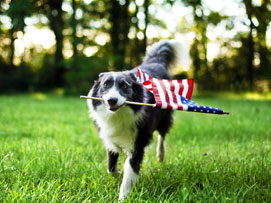Tips for you and your pets to enjoy a happy and safe Fourth of July

The 4th of July is right around the corner, you and your family are prepared for a beautiful display of fireworks, but is your pet? Studies have shown that about 80% of pet owners have a companion that is afraid of not only the loud display of fireworks but also thunder and lightening strikes. Here at Animal Medical of Chesapeake we have some recommendations that may help ease not just your pet but yourself as well with the 4th of July celebration.
Prevention -
- Leaving Pet at Home- Caught up in celebration, families sometimes forget how fearful pets might become with fireworks going off. Leave your dog at home when going out. If there is no other way, keep your doggie leashed and with you when attending the celebration. A child might not be able to control a frightened dog, so keep her tethered to an adults' side. Frightened dogs and cats can become unpredictable, so it is best to keep them inside in an enclosed room or carrier. Try to contain your furry gal before the activities begin.
-
Safe Zone - If you are able to leave your dog at home during the festivities, put her in a safe area. An enclosed space often provides comfort to a dog that is "sound" fearful. Keeping the windows closed and curtains drawn can sometimes help as well. Similarly, keep your cat in a separate room in your house on the big day. If you have guests, be sure to alert them as to whereabouts of your cat to ensure complete safety.
-
Distraction - Give your pet something they might enjoy doing - a favorite toy to play with or a frozen Kong filled with treats. Distractions of play toys can sometimes help.
Management -
- Behavior Modification - Muffling the sound by using cotton balls in the dog's ears may help, or using specifically designed ear protection (Mutt MuffsTM). Even covering the dog's head with a towel reduces noise stimulus. You can reduce visual stimulus by seeking safe haven in a basement or interior room, covering the windows or covering the dog's face with a Calming CapTM, which reduces but does not completely restrict the dog's ability to see. An Anxiety WrapTM or ThunderShirtTM may provide comfort and reduce anxiety. Music may be played to disguise the bursts of noise: consider loud music with a regular beat to obscure the noises associated with fireworks.
- Medical and Pheromone Interventions - There are medications and supplements that you can use to decrease your pet's anxieties. Pheromones, such as Dog Appeasing Pheromone (D.A.P.TM or AdaptilTM) or FeliwayTM (for felines) are synthetic versions of natural products that can promote a feeling of well-being and reduced anxiety. They are safe and non-sedating and can also be safely combined with other options to reduce anxiety. Use of certain medications may reduce the fear of fireworks by reducing the dog's fears and/or reactivity. At low doses, many medications promote a feeling of well being and support a positive learning experience; at higher doses an amnesia effect may be helpful so the dog's future learning is not influenced by a traumatic experience. For dogs with milder anxiety or specific fear only to fireworks, short-term anxiolytic (anti-anxiety) drugs are most useful. For dogs with severe reactivity to storms, noises and fireworks, treatment with other medications daily beginning months before the firework displays may be beneficial. Your veterinarian can assist you with the best options for your pet.
Identification- This is a great time to make sure your pet's identification is up to date. Micro-chipping your pet is the most effective method of ID'ing your furry friends. Check to make sure your contact information is up-to-date. If your pet has an ID on a collar, make certain it is secure - with a proper fitting collar - around your furry one's neck. Again, make certain your contact info is current.
Other Holiday Concerns - Summer brings with it cookouts and outdoor activities.
- Please be aware of how tempting our cook-outs and party goodies are to our 4-legged friends. Seasoning, sauces, bones, and alcohol can cause great gastric distress or even be poisonous to our pets. Be aware of where your pets are and what they have access to. Keep all human food and beverages out of their reach. Don't give in to the temptation to give pets scraps from the picnic table.
- Outdoor activities in hot summer weather bring the risks of heatstroke. Heatstroke can occur when animals are left outdoors in hot/humid conditions with adequate shade or access to fresh water; when exercised in hot/humid weather; and especially when left in cars. In a recent study from Stanford University Medical Center, the temperature within a vehicle even on a relatively cool day (70oF) can increase by an average of 40 degrees Fahrenheit within one hour, regardless of outside temperature. Some breeds, esp. those with short noses, are extra sensitive to heat stress, as are our overweight pets. Heat stress is very quickly life threatening and a pet suffering from hyperthermia should be moved to a shaded and cool place; cooled with fans and/or cool, wet towels (no cold water or ice!) and seen by your veterinarian as soon as possible.
Finally, while the fireworks are happening, be aware of where your pet is at all times. Even a dog normally off leash in a backyard or a cat that seems calm and tranquil in her backyard domain might suddenly dart at the sound of a loud bang. Fearful stressed out animals often run for miles.
We here at Animal Medical of Chesapeake hope that you and your pets enjoy a happy and safe Fourth of July!
|